Reasons to sleep outside
If you can't remember the last time you did this, your life is kept tethered to your routine (including sleeping indoors) and glowing screens. Let's get away from it all and imagine a vacation. Adults rest easier once you take work out of the picture and the same goes for younger people and school.
Chances are you've envisioned a luxury hotel in an exotic location – who wouldn't? But nature has a magic of its own, you can feel the same even with a sleeping bag and a patch of grass. Not only can it help you relieve stress but even improve your sleep quality!
Realigning with your circadian rhythm
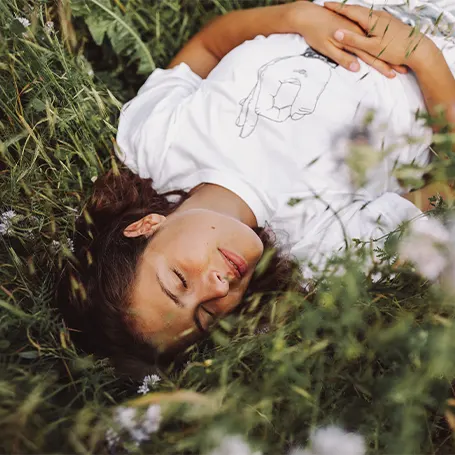
If you're not 100% sure who directs your daily sleep, wake and activity cycles during the day – that's circadian rhythm. However, you must have heard of the internal clock, which is the same. There is a physical location in the brain where it is housed and controls complex physiological processes from there.
They do not happen randomly, but there is a simple mechanism synchronised to the sunrise and sunset. This is dictated by a drop in body temperature as well as the amount of natural light you can see. That's where the influence of nature comes in!
Such an environment helps you maintain balance (homeostasis) in contrast to a different environment with many disruptors (such as traffic, light pollution and noise). We cannot put all the blame on them, because you are responsible for maintaining your sleep hygiene and following the natural light-dark cycle.
Exposure to fresh air and oxygen
An elevated level of carbon dioxide in your blood leads to confusion, less productivity and causes headaches and breathing problems. For example, you may feel this way in a room with poor ventilation. Yet, the air in the urban environment is far worse than in nature. Well, take just one nap outside, and you'll feel reborn. Imagine getting up in the morning, taking a deep breath, your lungs expanding and oxygen infusing every cell of the body.
At that moment, the simple act of breathing in the natural is the elixir of revitalisation. Because of this, you will feel a boost of vitality and have more energy during the day. On the other hand, exposure to clean, oxygen-rich air can lift your mood and promote a sense of calm. As you know, it is necessary for uninterrupted slumber.
Reduction of artificial light
Phones, tablets, TVs, and computers – an inexhaustible source of entertainment! Slow down a bit, party maniacs and leave it for the day if you want to get a good night's sleep. If that doesn't work for you, I know what they want. Escape to nature, and try a different kind of entertainment your body prefers. These devices emit light rich in blue wavelengths – it can suppress the production of melatonin (sleep hormone).
So, this can confuse your internal clock, and your body will think it's still daytime. You must send your brain the right message to unlock the restful phase and improve cognitive function tomorrow. Fortunately, you don't have to worry about street lights and other light sources when you sleep outdoors. Turn off those screens or dim the lights, put on a sleep mask and send a clear signal – it's time to sleep!
Connection with nature and stress reduction
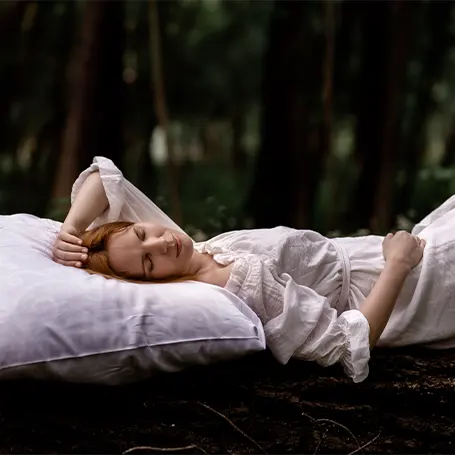
If you think of stress as red spots, nature acts like a corrector for your mood. Staying in an area rich in greenery relaxes and improves mood is nothing new. However, we want to explore it more deeply.
If you turn off your devices, close your eyes and focus on external influences, you will feel all your senses awaken. Like calming apps with sounds of nature, you will feel more relaxed and relieve tension. One reason is predictable sounds like rain, crackling fire, or the sound of birds.
All these sensory experiences work together to reduce or eliminate stress. Then chemicals such as endorphins and oxytocin, known as “feel-good” hormones, are released. They directly affect your mood and promote a sense of happiness.
Finally, the disconnection from the fast-paced digital world has a therapeutic effect. That temporary escape is a chance to recharge, reset, and return to your daily life with more energy.
Boosting vitamin D levels
The skin produces vitamin D when exposed to sunlight. On the other hand, it leads to disturbances in the metabolism of calcium, phosphorus and bones. So, make up your mind. To better understand the connection between your body and the sun, imagine yourself nestled in a cosy sleeping bag under the open sky.
Now you are probably wondering, where is the sun? You may not see it, but the sun's magic is still at work. After a good night's sleep, you are slowly awakened by the gentle warmth of the sun's rays on your skin. This will trigger the production of vitamin D; if you spend enough time staying and sleeping outdoors, you will feel many benefits.
It refers to bodily functions, bone health, immune system support, and even mood regulation. However, find a balance. The sun is a great source of Vitamin D, but too long exposure can lead to skin damage. Therefore, apply sunscreen regularly and wear protective clothing. Remember, early morning or late afternoon are the best times for sun exposure.
Regulation of melatonin production
You know it's the sleep hormone, but let's see how being in nature affects it. Although our bodies naturally secrete this hormone, some factors negatively affect the process. It is also known as the “hormone of darkness”, obviously why. That's why sleeping in nature is a great way to restore melatonin production to factory settings!
When you expose yourself to natural darkness, your brain gets the cue that it is time to transition from wakefulness to rest. Also, production slows down at the sun's first rays, and your internal clock starts to work better. Over time, the body remembers these instructions and starts producing melatonin right on time.
What does it mean? During sunset, the process of falling asleep begins. Now, try to see the contrast with indoor environments where you are exposed to artificial lights and screens more than sunset.
Promoting physical and mental wellness
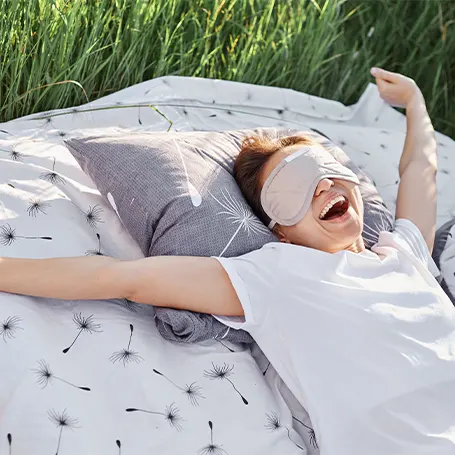
Silence, the smell of fresh air and the greenery of nature is an ideal environment for escaping from everyday worries and problems. However, sometimes you need just the opposite. We often don't have enough time to stop and find understanding for our feelings. Walking in the woods and sleeping over can be a way to fix it.
It is an opportunity to connect with your thoughts and feelings, free your mind from unnecessary thinking and achieve inner peace. Even if you return to your busy everyday life, you will be more ready to face new challenges.
Of course, better air quality also contributes to this because you are not inhaling harmful particles. If some physical activity like hiking is part of the plan, you will also strengthen your physical health.
This will positively affect your blood pressure and the secretion of stress hormones. All of the above has a beneficial effect on all your organs and the entire organism.
Strengthening immune function
If you feel the need to regenerate, take it as an alarm. Your body is experiencing burnout, and that's not a good sign. In fact, it is just like any other high-voltage machine. You need to maintain its engine – the immune system. This includes equal investment of effort in physical and mental health.
By now, you have realised how much nature affects them, and every improvement improves your immune system. Especially Vitamin D, for which it is the main function in the body. But nature is more like a multivitamin that protects in many different ways. While in stressful situations, we are in “fight or flight” mode, being in a peaceful environment puts us in “rest and digest” mode.
Then we feel safe, meaning the body directs all its forces towards growth and development. Relaxed mode strengthens it, but don't forget about the importance of nutritional diet and lifestyle.
Tips for a successful outdoor sleep experience
Still, we can almost hear the sceptics saying, “But what about the bugs and discomfort?” We understand you because most of us live in an urban environment. Sure, you'll probably have the company of a mosquito or two, but you can prevent other inconveniences.
Choosing the right location
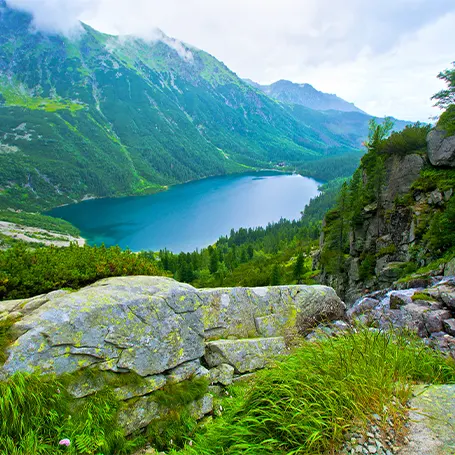
By sleeping in nature, you are doing the right thing for your mind and body… blah, blah. But sometimes nature can turn against you! Just kidding, nothing bad will happen except maybe – leaks, uncomfortable sleeping surfaces, bugs and other unwanted guests. There is a better way to experience nature if you find the right location.
The safest option is an arranged camp, but its drawback is the lack of freedom and the obligation to respect the “camp rules”. You also don't get to choose who is in the tent next to you, and there will be many of them. If you don't want that kind of experience, you have no choice but to find the place yourself. Easy, just follow these steps:
- Check the level of safety – check if the place you have chosen is risky due to tall trees and branches that could fall on the tent
- Look for flat ground – flat and level areas are more suitable for setting up tents, unlike slopes, rocky ground, or uneven surfaces
- Find a source of drinking water – it is necessary if you did not bring enough water, but set up camp at a reasonable distance from rivers, streams or lakes
- Check wildlife and plants – avoid locations near animal tracks, burrows, or feeding areas, as well as areas with dense vegetation
- Pay attention to the sun and wind direction – you will need shade during the hottest parts of the day, as well as a natural windbreak (e.g. behind a rock or tree)
Last but not least are local regulations and restrictions you must check before setting up camp. Some places may require permits.
Essential gear and preparation
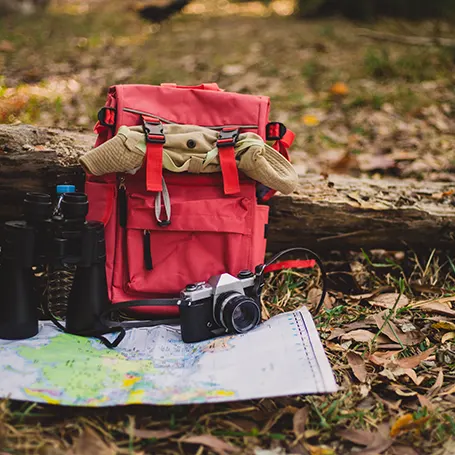
You set up your tent and think that's it? Maybe. If you are Bear Grylls! Otherwise, you'll need more gear. Choosing the things you take camping is crucial to staying alive, healthy, dry, full, gassy and safe. Let's add a few things to your list:
- Sleeping bag – the choice depends on weather conditions, season (winter/summer sleeping bags), personal preferences and needs
- Flashlight – get at least three (one for the tent, one to go everywhere with you and the headlamp)
- Sleeping Pad or Sleeping Mat – provides insulation from the cold ground and adds comfort to your sleeping setup
- Footwear – wear appropriate footwear for the terrain and weather conditions
- Cooking Equipment – portable stove, fuel, cookware, utensils, but also multi-tool or knife
- Navigation Tools – have a map and compass or a GPS device
Of course, you must not forget to bring a well-stocked first aid kit. It should include basics like bandages, antiseptics, and pain relievers. Personal hygiene matters are equally important.
Setting up for comfort
Creating a comfy sleeping area requires research and planning of the area you'll be camping in. So, check the weather conditions a few days before camping. Then, research the terrain and regulations and plan your route and campsite locations. However, always be prepared for changes in conditions and pack accordingly.
When you get there, do your best to clear the ground of twigs and other debris. Also, bring a pillow, head support, and earplugs if you want to sleep in complete silence. But, you need to do one more thing to protect yourself against discomfort while sleeping outside. Use insect repellent, wear protective clothing and don't forget the mosquito net or bug screen.
Tips: Camping near standing water can be breeding grounds for mosquitoes. So choose a location with good air circulation and wind; chances are higher that you won't find them there.
Campfire safety and warmth
After you have checked the regulations, chosen a suitable location and cleared the area, create a fire pit. We recommend you dig a fire pit about 1 foot deep and surround it with rocks to contain the fire. However, avoid the environment where there are flammable materials. You should always have water and tools ready to quickly extinguish the fire.
Dressing in layers and warm drinks/food will keep you warm, especially wool and synthetic materials. For cold nights, insulating sleeping bags are a must-have! Remember, always follow the rules and guidelines for campfires in your camping area.
Digital detox
A digital detox refers to a period spent without digital devices such as smartphones, computers and television. It also implies not using the Internet and social networks. Now you might be thinking – but, all the entertainment and information is right on the phones? Yes, as long as you don't catch yourself checking your phone every 15 minutes. Do the following:
- Set the goal and approximate duration of the detox
- Notify Contacts
- Use devices only when necessary
- Complement your time with other activities
We understand you because there are endless messages and games on Instagram, Twitter, Tiktok. A million things keep us tied to our phone but also make us tired. That's why a digital detox can be a great thing. When you spend less time on the Internet and on the phone in general, you will sleep better, feel better, and have more energy. You can have just as much fun online, especially when you decide to go on an adventure like this!
Wind down routine
Although nature is soothing, use some relaxation and unwinding techniques for even better sleep quality. Since you're on a digital detox, you have all the time in the world to plan! Let's create a wind-down routine for the next sleepover. First, try to get everything set up before the sun sets. If you have not done so, disconnect from the digital device (notify your contacts). However, you don't have to lie down yet but take a gentle walk around your campsite or the nearby area.
On the other hand, if you plan to have a campfire, start working on it as soon as possible to stay warm even without warm air. Avoid heavy or caffeinated foods and drinks, because they are the most common sleep disruptors. Finally, engage in gentle stretches or write down your thoughts and feelings in a journal.
It will calm your mind and reduce stress. Of course, you can read, listen to nature sounds, stargaze, or do some other calming activity instead.
Embracing the experience
How to do it? Simply be present – easier said than done, but there are several ways to practice it. For example, focus on the sights, sounds, and sensations around you. Don't just let go of a pleasant feeling, even because of a gentle breeze.
But let go of all distractions and worries from the outside world. Try to engage your senses as much as possible to enhance the richness of the experience. You may not be used to such a slow rhythm, but that's how nature works; you can understand it better by slowing down. Use that time to cultivate a sense of wonder and curiosity by exploring plants and geological features. Such experiences are priceless!
Conclusion
Well, it looks like we have a lot of physical and mental benefits here. Therefore, try to go one step further from the noise of modern life. Think of it like the world of Narnia (a series of novels by C. S. Lewis), but without lions! Outdoor sleeping is an opportunity to experience the tranquillity of natural surroundings and cultivate gratitude.
In such a place, you can embrace the present moment and finally get some sleep. Although there are numerous reasons why sleeping outside is recommended, don't forget the importance of preparation. You may not find lions there, but mosquitoes can be very sneaky. So don't embark on this adventure without a proper route plan and gear.
Spread the word
Recommended reading:

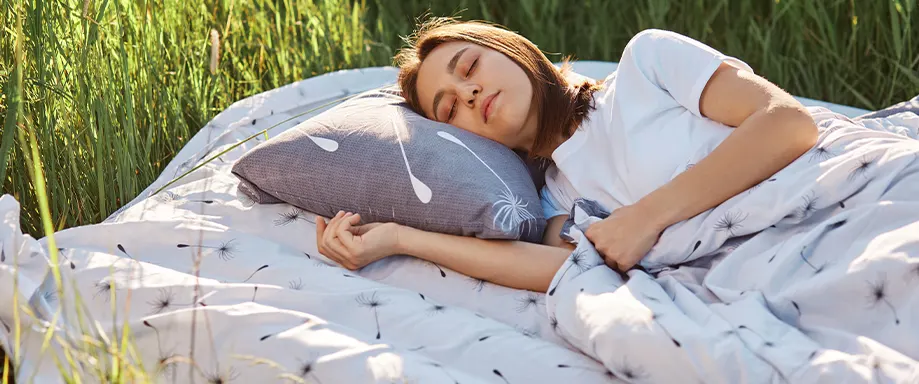












There are no comments yet
"*" indicates required fields